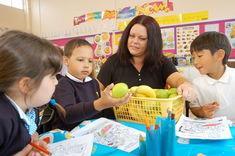

The department of health (DoH) has issued a statement to rebutt suggestions in a national newspaper that the School Fruit & Vegetable Scheme (SFVS) is failing and in danger of being curtailed.
A report in the Sunday Telegraph said an independent report by the National Foundation for Educational Research and the University of Leeds had concluded that the initiative has not improved pupils’ diets and quoted various statistics to back up that argument.
Suppliers to the scheme, involved in the tendering process for 2008 contracts, expressed their surprise at this news and sought clarification. In response, NHS PASA, through statements from both the DoH and Fresh Produce Consortium (FPC), pointed out the inaccuracies in the article, which used figures that do not reflect its own understanding of the situation.
“The Sunday Telegraph article published on April 29, 2007, contained a number of factual inaccuracies about both the current cost of the School Fruit & Vegetable Scheme and the latest evaluation carried out by the National Foundation for Educational Research,” said the DoH. “The latest evaluation report is still at the drafting stage and the findings will be published in due course.”
The results of the report are awaiting ministerial approval before publication, but FPJ understands from several sources that they are likely to give an overwhelmingly positive message.
The FPC slammed the “scaremongering comments”, which came hard on the heels of another inaccurate press report regarding pesticide residues in fruit provided top the scheme just a fortnight ago. “It does not help the cause that information is being published that is neither accurate nor promoting informed debate from a consumer or industry perspective,” its chief executive Nigel Jenney told FPJ.
“It is important to note that the report has yet to be published; therefore, constructive consultation based on fact is impossible at this stage. We look forward to receiving a copy of the report once published and to subsequent accurate, informed debate.”
The DoH moved to quash the rumour that the scheme could disappear, but did admit its structure is under review. “There is guaranteed funding for the scheme until March 2008, and we are currently reviewing the effectiveness of the scheme and its overall contribution to our strategy to improve children’s diets and tackle childhood obesity,” said the statement.
“Given the size of the scheme, its logistical complexity and the size of the investment by the department, it is good practice to review both its effectiveness and operation on a regular basis.”
In the initial article, critics described the SFVS as “hopeless” and “badly run” and accused it of failing to implement the educational backing to have a long-term impact on consumption habits.
Suppliers to the scheme, however, refute that suggestion. “I am astonished to hear comments like that,” said Dickon Poole at JP Fresh. “Schools call us every week asking for assistance in promoting various fruit and veg initiatives and we are always there to help. My understanding is that the results of the scheme have been extremely encouraging to date and what we see day to day is that the momentum is very much still there.”
At Total Produce, Denis Punter was equally perplexed: “These articles are written with a political agenda, but the fundamental issue is whether children are eating more fruit and vegetables. We certainly believe that they are. In terms of the scheme being stopped, why would they be so far down the line with the tendering process for 2008 if they have no intention of continuing?”